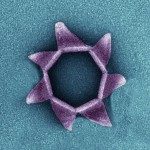Lien vers Pubmed [PMID] – 25540376
J. Virol. 2015 Mar;89(5):2875-83
UNLABELLED: All viruses are obligate intracellular parasites and depend on certain host cell functions for multiplication. However, the extent of such dependence and the exact nature of the functions provided by the host cell remain poorly understood. Here, we investigated if nonessential Bacillus subtilis genes are necessary for multiplication of bacteriophage SPP1. Screening of a collection of 2,514 single-gene knockouts of nonessential B. subtilis genes yielded only a few genes necessary for efficient SPP1 propagation. Among these were genes belonging to the yuk operon, which codes for the Esat-6-like secretion system, including the SPP1 receptor protein YueB. In addition, we found that SPP1 multiplication was negatively affected by the absence of two other genes, putB and efp. The gene efp encodes elongation factor P, which enhances ribosome activity by alleviating translational stalling during the synthesis of polyproline-containing proteins. PutB is an enzyme involved in the proline degradation pathway that is required for infection in the post-exponential growth phase of B. subtilis, when the bacterium undergoes a complex genetic reprogramming. The putB knockout shortens significantly the window of opportunity for SPP1 infection during the host cell life cycle. This window is a critical parameter for competitive phage multiplication in the soil environment, where B. subtilis rarely meets conditions for exponential growth. Our results in combination with those reported for other virus-host systems suggest that bacterial viruses have evolved toward limited dependence on nonessential host functions.
IMPORTANCE: A successful viral infection largely depends on the ability of the virus to hijack cellular machineries and to redirect the flow of building blocks and energy resources toward viral progeny production. However, the specific virus-host interactions underlying this fundamental transformation are poorly understood. Here, we report on the first systematic analysis of virus-host cross talk during bacteriophage infection in Gram-positive bacteria. We show that lytic bacteriophage SPP1 is remarkably independent of nonessential genes of its host, Bacillus subtilis, with only a few cellular genes being necessary for efficient phage propagation. We hypothesize that such limited dependence of the virus on its host results from a constant “evolutionary arms race” and might be much more widespread than currently thought.

